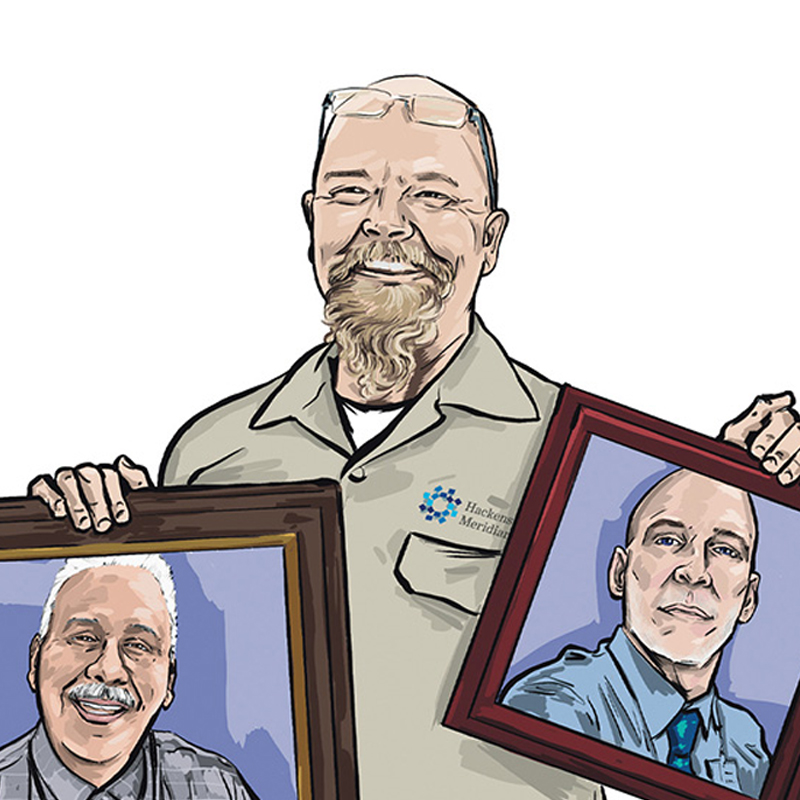Colts Neck Realtor Overcomes Heart Arrhythmia

November 02, 2023
Real estate agent John Sherrod, 54, is no stranger to hard work. So when the Colts Neck, New Jersey, resident was fixing up a large investment property, he could tell that something was off each time he got out of breath while climbing the three flights of stairs. He would get so lightheaded that he needed to clutch the railing and rest.
Initially, John marked it up to working too much in his rush to get the property ready for sale while the market was still hot.
“That happened for a little while, then I realized I had better get to the doctor or my wife would kill me,” he says. “My heart was pumping so hard that it felt like I might black out.”
Finding a Diagnosis: Atrial Flutter
John first went to his primary care provider, who was surprised to see him so soon after his annual preventive visit, where he had a normal EKG. His doctor did another EKG and immediately saw the problem: John’s heart was vacillating between a normal rhythm and beating six times as fast as it should.
John was referred to cardiologist Aaron Van Hise, D.O., at Old Bridge Medical Center, who performed a nuclear stress test and an echocardiogram. Those tests narrowed down a diagnosis of atrial flutter (a type of arrhythmia in which the upper heart chambers beat too quickly) but revealed nothing out of the ordinary that could be causing John’s heart to beat so fast. In addition to the uncomfortable symptoms it was causing, the arrhythmia put John at a high risk for a blood clot leading to a stroke.
The cause of atrial flutter often remains unknown, but getting older, hypertension, thyroid disease and coronary artery or valve disease raise the risk for these conditions. In John’s case, it was likely a combination of age and stress from the volatility of the real estate market.
Atrial flutter can be episodic or near constant for hours, days, months or years. It can resolve on its own, but a progression of treatments from medication to cardioversion can put a stop to it. If the first-line treatments don’t work, patients may be referred to an electrophysiologist, a subspecialist cardiologist who specializes in heart rhythm disorders and can perform further testing and, if indicated, an ablation procedure to short-circuit faulty electrical signals in the heart.
Shocking His Heart Back Into Rhythm
Dr. Van Hise started John on a blood pressure medication and a blood thinner, but the medication didn’t slow John’s racing heart. There was also a suspicious shadow on John’s echocardiogram that invited investigation, so Dr. Van Hise referred John to cardiologist John Covalesky, D.O.
It was important to quickly find the cause of John’s atrial flutter, because the sooner it’s addressed, the more effective treatment can be. Dr. Covalesky performed a transesophageal echocardiogram to rule out any evidence of blood clots in the heart or valve disease and, if it was determined John was a candidate for it, perform a cardioversion (a procedure that uses quick shocks to restore heart rhythm) at the same time.
“The longer a patient is in atrial fibrillation, the less likely cardioversion is to be successful,” Dr. Van Hise says. “If we do it within a few months after diagnosis, the chances of it being curative are highest.”
Under conscious sedation, Dr. Covalesky passed a probe down John’s esophagus to get a better look at the back of his heart. After he confirmed there was no sign of blood clots, he shocked John’s heart with external paddles at a carefully synchronized interval, instantly restoring normal rhythm.
“I got a good half-hour nap that felt like a minute, then when I woke up it was unbelievable how much better I felt,” John says. “It worked like a charm. It was like resetting a battery on a car.”
No More Signs of Atrial Flutter
Two years later, John still feels great and has had no recurrence of atrial flutter. Although many patients stay on blood thinners lifelong to reduce stroke risk, John has chosen to avoid medication.
“I’ve been absolutely healthy since,” he says. “Your body tells you when you’re in stress and you need to acknowledge it. I’m glad I listened to my body and took care of what was going on, because it could have eventually killed me.”
Next Steps & Resources:
- Meet our sources: Aaron Van Hise, D.O., and John Covalesky, D.O.
- To make an appointment with a cardiologist near you, call 800-822-8905 or visit our website.
- Learn more about cardiac care at Hackensack Meridian Health.
- Schedule a heart screening near you.
The material provided through HealthU is intended to be used as general information only and should not replace the advice of your physician. Always consult your physician for individual care.






